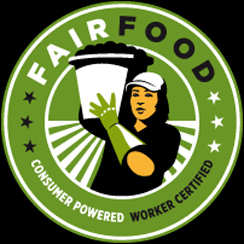 Florida grows 90% of America’s tomatoes, and Immokalee, Florida, lies in the heart of tomato country. It’s also a town with a brutal reputation for mistreatment of migrant farmworkers including wage theft, beatings, and sexual exploitation. The modern-day slavery conditions in southern Florida were first exposed in Edgar R. Murrow’s famous 1960 TV documentary, “Harvest of Shame.” The Coalition of Immokalee Workers and the Fair Food Program were born in these fields.
Florida grows 90% of America’s tomatoes, and Immokalee, Florida, lies in the heart of tomato country. It’s also a town with a brutal reputation for mistreatment of migrant farmworkers including wage theft, beatings, and sexual exploitation. The modern-day slavery conditions in southern Florida were first exposed in Edgar R. Murrow’s famous 1960 TV documentary, “Harvest of Shame.” The Coalition of Immokalee Workers and the Fair Food Program were born in these fields.
Although conditions have improved somewhat for Immokalee’s tomato workers, they’re still bad, and reforms haven’t come easily. Growers fought change, and were unmoved by years of marches and strikes. Activists then went to the big buyers — fast food and grocery chains — and achieved progress.
McDonalds, Chipotle, Trader Joes, and — finally, last year — WalMart have signed up for Fair Food. Under it, buyers agree to pay a penny more per pound for tomatoes, and to buy only from growers who satisfy the following conditions:
- Buyers must agree to pay a “penny more per pound” of tomatoes.
- Farms will implement the “Code of Conduct” which forbids forced labor and sexual violence.
- The CIW will run education sessions that teach workers about their rights on the farm.
- There will be a worker-triggered complaint resolution mechanism so that farm workers can report violations, including a 24-hour hotline.
- Farms will have health and safety committees, which will provide workers with a clear voice in the work place.
- The Fair Food Standards Council will have ongoing audits to guarantee that farmers comply with each of these elements.
The “penny more per pound” raises the typical worker’s pay by $60 to $80 a week. The other reforms improve working conditions. Pressured by the big buyers, most growers go along; according to CBS News, “Ninety percent of Florida’s tomatoes are now grown on ‘fair food’ farms.”
Publix, Florida’s largest grocery chain, has not signed up for Fair Food. They argue, “We expect our suppliers to follow the laws established to protect and promote a safe and healthful workplace for their employees. We believe all parties would be better served if appropriate wages were paid by growers to their workers, and we were charged accordingly.” That’s a total copout akin to letting the fox to guard the hen house. If growers, left to their own devices, had done that neither CIW nor FFP would have come into existence. Publix, in effect, condones the brutal conditions that existed before CIW and FFP, because only pressure on growers from buyers like Publix were effective in bringing about changes.
So, yes, it makes a difference where you shop and eat out. Read the story here.
I can’t wrap up this article without mentioning that Immokalee is in Collier County, Florida, where a sheriff’s deputy is linked to the disappearances of two minority men and an attack on a black teenager.
 Felipe Santos disappeared in 2003 and Terrance Williams in 2004. In both cases, the men were last seen by witnesses as they were being arrested by Deputy Steve Calkins, who didn’t report the arrests and whose explanations of what happened to them in his custody are full of holes. The men were never found, but Calkins hasn’t been arrested or charged. In 2013, a third man, Anthony Denson, alleged that, in 1997 when Denson was 14 or 15 years old, Calkins and three other Collier County deputies chased him on a beach and he thought they were going to kill him. You can read Santos’, Williams’, and Denson’s stories here and here. Remember, these are only allegations and under our system Calkins is entitled to a presumption of innocence so long as he hasn’t been proven guilty in a court of law.
Felipe Santos disappeared in 2003 and Terrance Williams in 2004. In both cases, the men were last seen by witnesses as they were being arrested by Deputy Steve Calkins, who didn’t report the arrests and whose explanations of what happened to them in his custody are full of holes. The men were never found, but Calkins hasn’t been arrested or charged. In 2013, a third man, Anthony Denson, alleged that, in 1997 when Denson was 14 or 15 years old, Calkins and three other Collier County deputies chased him on a beach and he thought they were going to kill him. You can read Santos’, Williams’, and Denson’s stories here and here. Remember, these are only allegations and under our system Calkins is entitled to a presumption of innocence so long as he hasn’t been proven guilty in a court of law.
A common feature of anti-government movements is a notion that county sheriffs are the highest authority in the land. The significance of this is that it would make sheriffs a law unto themselves, answerable only to local voters, with dictatorial powers. Why are sheriffs the pets of insurrectionists, secessionists, and other far-right extremists? My take on that is that sheriffs, as political officeholders, tend to serve local power interests. If you look at a political map of the United States, it is mostly red, because the vast majority of counties are politically conservative. Yet, we have a black Democratic president. How can this be? Simply because the population is concentrated in cities, and urban voters are more liberal. Rural America is overwhelmingly conservative, but only a minority of the population. Another reason why rightwing extremists may be partial to elected sheriffs is because, in American history, they have often played a role in repressing labor movements by using force to break up strikes and intimidate labor organizers and protesters. Not infrequently, local law enforcement in the persons of elected county sheriffs are in league with growers and businessmen who perpetrated farm country labor abuses.
It’s not hard to find examples of sheriffs allying with the rightwing political fringe. Arizona’s notorious Sheriff Joe Arpaio has become famous by thumbing his nose at federal authorities. He, along with Donald Trump, is one of the most prominent spokespersons for the anti-Obama “birther” movement. Arpaio also has compiled a record of discriminating against Hispanics and minorities, which has made him a target of federal investigations. Currently, he is facing federal contempt charges for allegedly ignoring federal court orders. And in the 2014 Bundy Ranch standoff, a former Arizona county sheriff, Richard Mack, gained national attention and became a minor folk hero in rightwing circles by supporting the Bundy insurrectionists. Going farther back in history, it was a local sheriff and his deputies — members of the Klan — who facilitated and helped carry out the infamous 1964 Mississippi civil rights workers murders.
Thus, it’s not surprising that in places like Collier County, Florida, and California’s rural agricultural counties, local sheriffs have often been important allies of business interests who exploit workers and perpetrate labor abuses. Historically, sheriffs have played leading roles in breaking strikes and intimidating labor organizers. Sheriffs do possess a considerable power to bully people they and their political supporters dislike; no wonder rightwing extremists love them, and like to visualize them as the supreme (and only) law of the land.
 Photo: Collier County, Florida, sheriff’s deputy Steve Calkins has been linked to the mysterious disappearances of two minority men in 2003 and 2004 and an alleged attack on a minority teenager in 1997, but hasn’t been charged or convicted in these incidents.
Photo: Collier County, Florida, sheriff’s deputy Steve Calkins has been linked to the mysterious disappearances of two minority men in 2003 and 2004 and an alleged attack on a minority teenager in 1997, but hasn’t been charged or convicted in these incidents.
